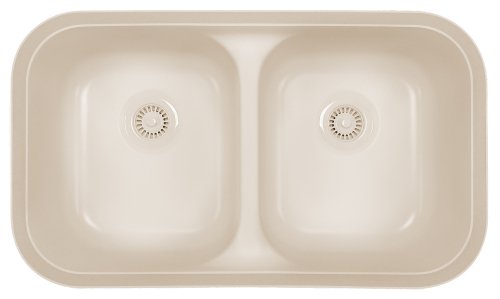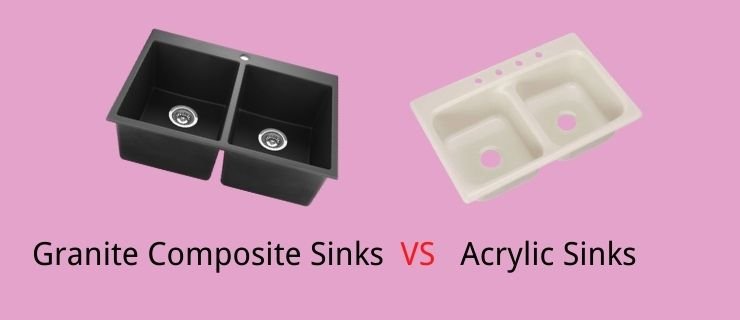It is important to highlight the differences between acrylic sinks and granite composite sinks to aid buying decisions.
Other than looks, certain factors differentiate them from each other.
Some of these factors are discussed below in this article.
Difference Between Granite Composite Sinks and Acrylic Sinks
These factors range from their cost to their composition, production process, strength, and appeal to the eye.
Composition
Acrylic sinks are made of acrylic backed with fiberglass and resin. It is made through the heat-molding process to give it the desired shape. These sinks are an economical alternative to enamel-on-steel-sinks. They offer a great range of variety in colors and designs that help in satisfying customer demand. These sinks are not prone to chip and stains as acrylic does not chip as easily as enamel, but hot appliances can melt and deform the material.
Firstly, both these sinks differ in their compositions. Differences in the material used in the creation of these sinks affect almost every feature that they have.
Porosity
Studies have shown that acrylic sinks are more porous compared to granite composite sinks. This difference is caused due to the amount of binding agent that they contain. Granite composite comprises only 20% acrylic, whereas the acrylic sinks are made of heat-molded acrylic plastic backed with fiberglass and resin.
The material used helps in binding the substance together and molding them into the desired shape. Since granite composite sinks have more minerals, they have a porous structure.
Besides, the homogeneity of minerals increases the porosity. Therefore, granite composite sinks have higher porosity which affects their ability to fight stains. This also makes it hard to clean granite composite sinks and requires much greater effort to clean them.
Porosity also affects the ability of granite composite sinks to combat bacterial growth on the surface. Acrylic sinks are less spacious, so it slows down bacterial growth, ensuring cleanliness and hygiene. So its users don’t have to worry about complicated cleaning that increases the hassle.
Relative Heat Resistance
The granite composite sinks’ production process involves forming minerals from high-temperature impact, so they are more heat resistant. This is due to the more significant proportion of natural stone in the mixture that increases the heat resistance.

So the granite composite sinks have higher heat resistance compared to acrylic sinks. This is because granite composite sinks contain 80% quartz sand while acrylic sinks are made from a thermosetting plastic called polymethyl methacrylate.
Acrylic sinks can resist heat, but frequent usage of hot pans might cause the color to change. Along with the inability to stand the heat, Acrylic sinks cannot stand up to petroleum-based materials. So if you use your acrylic sink to wash your paintbrushes after varnishing the kitchen cabinet, the chances are that the soft polycarbonate used in the acrylic sink will cause damage to the sink.
How Easy It Is To Repair Them
What makes a sink repairable is the resin content that it contains. The usage of acrylic brings a smooth feel and adds to its shine. Granite composite sinks, therefore, have more shine since they contain a high percentage of resin.
Another benefit is that the high percentage of acrylic brings its reparability. Hence, the acrylic of granite composite sinks is more repairable. This benefits the user since a breakage in the sink will not demand installing a new one but some repairs to keep it working.
Repairing acrylic sinks might be more complicated, but repairing kits is available in the market, making it easy to fix them. However, one should follow the safety precautions since the repair contents can damage the eyes, lungs, and skin.
Scratch Resistance
One feature of natural stone is that it does not reveal the scratches and chippings on it. One can try this by scratching a rock. The result will be no or very few scratches that give it a fresh look.
Since granite composite sinks are formed using a mixture of rocks, they are more chip and scratch-resistant. They also are rich in mineral content. So one does not have to worry about their sinks giving a weary look.
Another aspect to this is that granite composite sinks users will not have to stay alarmed to use a board while cutting vegetables. However, if you don’t use a slicing board while cutting vegetables on an acrylic sink, you might risk putting scratches on it.
Polycarbonate plastic in acrylic sinks helps the material’s color to stay the same throughout. This means that minor scratches on acrylic sinks can be wiped out, unlike enamel. However, acrylic sinks don’t have porcelain’s durability, which means the usage of acidic cleansers to wipe out stains can burn holes in the sink’s surface.
Production Processes
Both these sinks have similar production processes as it involves mixing, molding, trimming and remolding. They are gel coated and polished as a part of the finishing process. However, granite composite sink production requires less effort as it contains higher natural stone content.
Quantity of Acrylic Resin
One big difference between the two that brings up other differences is the quantity of acrylic contained. Both compounds have different amounts of acrylic despite the same production process. Granite composite sink has around 20% acrylic, whereas acrylic sink has the most percentage of acrylic.

Acrylic sinks lack the depth that affects their strength. Therefore, their ability to hold weight is lesser than the granite composite sinks. So you have to be careful while washing heavy appliances.
This also affects the durability of the sinks. This is because we tend to put everything on the sink to save time and energy from moving back and forth. However, its resilience is low, so it might start cracking up after some time.
Risk of Discoloration
Granite composite sinks have higher heat resistance, so the risk of discoloration is low. The acrylic sinks start to discolor if it comes into contact with hot pans. This gives it an untidy and old look. However, with a car-buffing compound, stains can be easily removed from acrylic sinks that help maintain their look.
Price of The Sinks
Another difference between the two is the price. Granite composite sinks are more expensive than acrylic sinks since the former is manufactured with a very high percentage of natural stone.
Each piece of its material has a blend of crystals of natural stones that provides value for money. Acrylic sinks are cheaper than granite composite sinks, and it is relatively easier to maintain them. Their cleaning process involves washing them once a week by moistening a soft sponge with warm water and a few drops of dish wash liquid and wiping down the entire sink with the sponge. Rinsing this with warm water gives it a fresh and healthy look.
The Better Option
The granite composite sink retains its color well, which gives an appealing look. In contrast, the options are limited with acrylic sinks. So a buyer who is picky with color and design would want to opt for granite composite sinks.
Conclusion
Granite composite sinks offer several different installation options. This gives variety to the user to get it installed following his desires.
Lastly, granite composite sinks do not require sealing and resealing saves up the user’s money, and cover the high price paid during the sink’s purchase. Hence it might be the better option for a lot of people.
If you want to find a reliable supplier of granite composite sinks, Chica Dragon is a good choice. They researched the science behind granite composite sinks in great detail. Afterward, they applied this research to make top-quality kitchen sinks.

